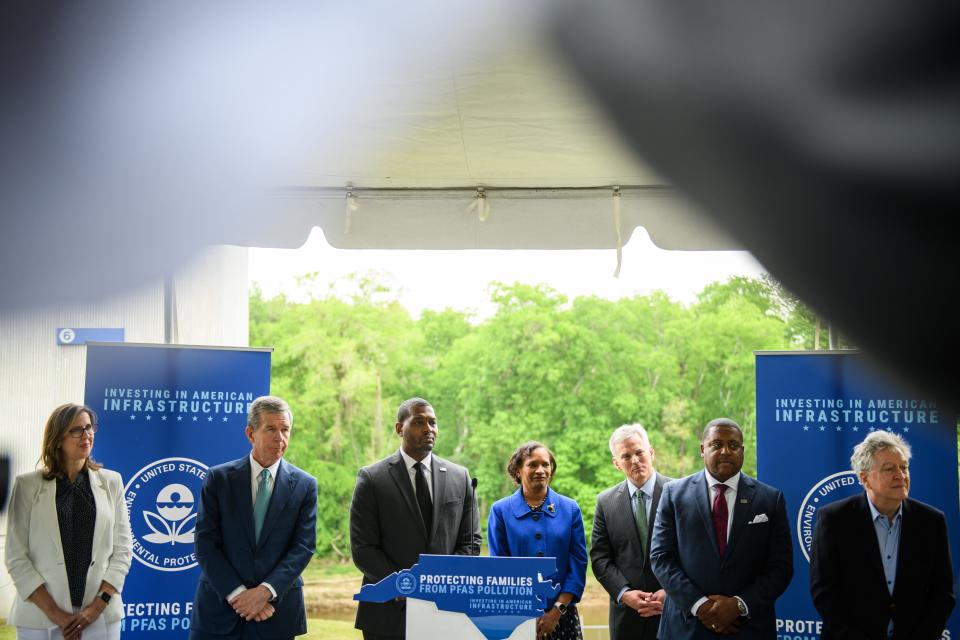EPA head Michael Regan returns to NC, announces new standards for 'forever chemicals'
The federal government has set standards for so-called forever chemicals in drinking water and will provide $1 billion for testing and other protective measures, said Michael Regan, the Environmental Protection Agency administrator, who spoke Wednesday morning in Fayetteville.
Regan announced the measures regarding PFAS, or per-and polyfluoroalkyl substances, at an event in front of the P.O. Hoffer Water Plant operated by the Public Works Commission, the locally-owned utility. Regan served as director of North Carolina’s Department of Environmental Quality from 2017 until March 2021 when President Joe Biden tapped him to head the EPA.
More: Residents still on bottled water as more ‘forever chemicals’ on way to Fayetteville Works
“Today I’m proud to return to North Carolina to announce the first-ever, nationwide, legally enforceable drinking water standard for PFAS,” Regan said, “the most significant action EPA has ever taken on PFAS.”
He said the chemicals, which are used in products such as non-stick coating for cookware and firefighting foam, “have a place and are important for certain industries and certain practices.”

But he added: “There is also no doubt that these chemicals entering into our environment in an uncontrolled manner are harmful to our families, harmful to our communities and harmful to our economy.”
The new standards will require utilities to test for six different types of PFAS in drinking water; the chemicals have been linked to certain types of cancer. The new standards limit PFOA and PFOS, two common types of PFAS, to 4 parts per trillion, as well as four other types of PFAS similar to those two.
The regulations could reduce the impact pf PFAS on 100 million people, Regan said.
A reporter’s question to Regan at Wednesday’s event noted that the standards addressed six types of PFAS but there were thousands.
“We’re starting with this six,” he said. “With this six, we have the best science and data to design these health standards.”
He said the EPA would “continue until we get to all of them.”

Activist: Persistent as forever chemicals
Other speakers Wednesday were N.C. Gov. Roy Cooper; state Attorney General Josh Stein; Brenda Mallory, chairperson of the Council on Environmental Quality for the Biden Administration; Fayetteville Mayor Mitch Colvin; Ken Cook, president of the Environmental Working Group; and Emily Donovan, co-founder of Clean Cape Fear and a mother whose family has been directly affected by PFAS pollution.
Donovan, who brought her daughters to the EPA event, listed several activists who had raised concerns about PFAS.
She said one of her fellow activists likes to say: “We are as persistent as PFAS.”
'Preparing for this day'
The Wilmington StarNews first reported evidence of PFAS pollution in the local water supply in 2017, tracing the contamination to the Chemours Fayetteville Works plant at the Bladen and Cumberland county line.
In 2019, a consent order was negotiated by Regan’s DEQ; Chemours; and the Southern Environmental Law Center, representing Cape Fear River Watch. It requires the chemical company to reduce its impact on the water, air and soil through several measures, including well-testing and providing bottled water or other replacement water to residents.

Cooper and Stein highlighted the state’s role in dealing with PFAS contamination.
“In North Carolina, we’ve already been preparing for this day,” Cooper said about the new standards. “Our Department of Environmental Quality is partnering with our local water systems, getting ready, taking hundreds of samples of water, providing technical assistance.”
The state will propose PFAS limits for surface and groundwater, too, he said.
'Bring some money by'
Cumberland County Commissioner Glenn Adams praised the EPA decision and said he believed it was just the beginning. The Wednesday announcement applies to the whole nation, he said.
“For us, we already knew what the issue was,” he said. “Hopefully when they talk about reducing limits they’ll bring some money by.
“We’ve already been talking about Gray’s Creek and Cedar Creek — it’s spreading” he said about PFAS contamination.
He says the officials he heard from today appreciated that funding was needed.
“It’s a health risk,” he said. “We always talk about the health risk.”
Opinion Editor Myron B. Pitts can be reached at 910-486-3559.
This article originally appeared on The Fayetteville Observer: 'Harmful': EPA head in Fayetteville announces new GenX, PFAs standards

